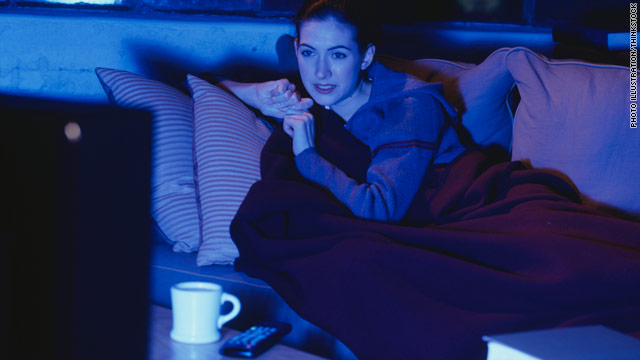
By the time Nancy arrived at the sleep center, she had been struggling for years to get a good night’s sleep. Her problems began when she was laid off work, but even when she was back on a regular work schedule, she could not keep a normal sleep/wake rhythm. It turns out that because she had trouble getting to sleep, she got in the habit of getting some work done on her laptop in bed and then she usually watches television or reads until it gets so late that she turns off the lights and tries to force herself to get to sleep. Often she gets so frustrated she just gets up and makes herself a snack or does the laundry.
Now, everyone knows that sleep specialists recommend removing the TV and computer from the bedroom because these things stimulate the mind and keep people from sleeping. But we give this advice not only because it will help relax their minds but because it will also help relax their brains. When you are watching TV at night or using the computer or walking around your house with all the lights on, you are stimulating that part of the brain that controls your sleep/wake cycle.
Light is the single strongest cue that tells your brain it is time to get up and feed the chickens — not what you want at 2 in the morning. Because people don’t know what a powerful stimulant light is, then they don’t realize that most of the things they do late at night when they can’t sleep, like watching TV, using the computer, or reading with a bright light, all these things just keep them up later because light turns on the brain.
Think about the way insomnia suffers usually describe their problem: “It’s just like someone flips the light switch in my brain and I am up all night.” Metaphorically speaking, this is very close to the truth. But the good news is, you might be able to turn off that internal light switch, if you turn off the external ones.
I recommend that people try to create a buffer zone between their hectic, daily lives and their sleep time. I encourage insomnia patients to try to set aside one to two hours before bedtime to do something calming to the mind and spirit, but also to the brain. Listening to a Brahms lullaby might calm your mind but if you have every light on in the room, you are not calming your brain. So turn the lights low and listen to soothing music or perhaps an audio book. Just be sure that it is not so suspenseful that you stay awake to find out whodunit. I tell my patients to listen to a book they know and love, perhaps one from childhood, because then they know what happens, but also it might have a comforting effect if they associate it with happy times from the past. . . maybe a time when sleep came easy.
For people who suffer from insomnia, it is essential that they understand the powerful role that light could be playing in perpetuating their problem. But for many people, it is often hard to carve out an hour or two of relaxing time spent in dim light. What I do in that case is recommend that they use special glasses that block blue spectrum light, because research has shown that light in that wavelength (450-490 nanometers) is the most potent stimulator of neurotransmitters that promote wakefulness.
Because insomnia is such a tough topic, I’ll be tackling it often as I blog about sleep for CNNHealth. My goal is to explain some of the biggest issues with sleep and offer advice that’ll help you get better rest. Come back and see us on Mondays on The Chart.
Lisa Shives, M.D., is the founder of Northshore Sleep Medicine in Evanston, Illinois. She’ll blog on Mondays on The Chart. Read more from her at Dr. Lisa Shives’ Sleep Better Blog.






0 comments:
Post a Comment